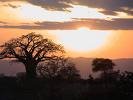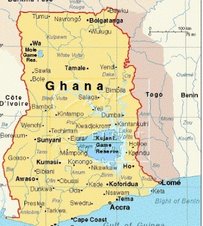"It takes a hard stone to make a sharp blade." These are the words that Nancy Ruther, the associate director of the Whitney and Betty MacMillan Center for International and Area Studies at Yale University, used to describe our leader and director of this program, Max Amoh. She used these words to undoubtedly inspire us participants because Max has put together for us a 43-day schedule that is extraordinarily full and rigorous. Some of you who are reading these entries have read an itinerary that I received by email back in May. As you can imagine preparing a 43-day trip for 15 educators would be very demanding. Well, there is no exception here and our itinerary now is similar, but it has slightly changed. Max has had a habit during our preparation to "fill up the day" with plenty of activities. Max has been true to his form so far; he is "a hard stone" whose goal is to make the participants "a sharp blade" in our shared quest of making the teaching about Africa - regular. More importantly, Max is also a very caring and warm individual. Here is an overview of our itinerary:
From July 8 - July 17 we will be in Accra and we will travel north throughout most of the country and then back south again. In Accra we will attend lectures at the University of Ghana at Legon; we will visit a local school and be paired with a Ghanaian teacher; we will visit Akosombo, the site of the dam that created Lake Volta; and we will visit Bojo Beach. On July 18 and 19, we will be in the the area surrounding the city of Tamale' where our featured activity will be visiting the Tamale' Islamic Secondary School. From July 20 to July 24, we will travel to the northern city of Bolgatanga where will visit a slave camping site, a crocodile pond and cross over the border into Burkino Faso. While in Bolga we will travel to Sirigu and visit The Sirigu Women's Organization for Pottery and Art (SWOPNA). We will visit yet another secondary school, a chief's palace, a unigue Catholic Orphanage for babies, visit a local market, and attend a cultural show. We will also travel to Tongu to visit another chief and we will visit a cave. We will then travel to Damongo for a guided tour of Mole National Park, and we will also visit a mosque in Larabamga that is over 300 years old. From July 25 - August 2 we will then venture south to Kumasi where we will get paired with another Ghanaian teacher. We will also attend the Akwasidae Festival as guests of the Asantehene (king), and visit the Asanteheman (the queen mother) who selected the Asantehene. We will also visit crafts villages where we will see among other things Kente' cloth being made. We will also visit the Obuasi gold mine (this area was popular to the Europeans for gold before it was popular for human capital - slavery). We will also watch the sunrise at Lake Bosumtwi, a lake created by a meteorite thousands of years ago. From Kumasi we will travel to Cape Coast where from August 3 - 6, we will probably enter the (emotionally) deepest part of our journey as we visit the (slave) castles at Elmina (which is Portuguese for the mines) and at Cape Coast. We will also visit the Nkroful, the hometown of Kwame Nkrumah, the first president of independent Ghana in 1957. From August 7 - August 9 we travel back east to Accra where we will further prepare for our homestays in the Akwapim Mountain Range from August 10 - 13. From August 14 - 19 we will be back in Accra for debriefing and our preparation for return. We leave Ghana on August 19. This recap of our 43 day journey does not include every thing we will do, but I have tried to include activities that seem very significant. I have omitted the fact that we are learning basic (very) Twi, an Akan language, so that we can hopefully engage in one of ghana's most popular activities - bargaining at the market place. We will be visiting many markets along our way.
Max said to us in our meeting last night,"you will see poverty in your face, but people are not destitute." All that we have heard suggests that the Ghanaian people are some of the most accepting and kind people in the world. They would share with us their last piece of food according to Max. I am at a loss of words to explain the range of emotions that are flooding througout me at this moment. We depart from New York in about ten hours and this time tomorrow, we will be about to land in Accra. I have paid close attention to the numerous experts that Max has brought before us. If a better program for teachers than the one that has become a part of me in the last year exists then I hope I am fortunate enough to be a part of it because I feel blessed and I haven't yet set foot in Ghana. I find myself both excited and a little intimidated by the next 43 days. I don't want to make any mistakes (although I am sure I will). I want to learn all I can because I believe educating students and helping other teachers to educate their students about what is happening in Ghana, the rest of Africa, and the rest of the world is vital to the future. For those of you who plan to join me via this blog, I hope I am able to relay to you an important part of this experience. To you I say in Twi, Medaase (Ma' das e') which means thank you. Medaase for joining me. If you enjoy what you read then please encourage others to do so. I do not know how often I will be able to post entries, but I will try to do so often. Until I see all of you again, I simply say good-by in Twi, "ninte yie" which literally means walk well.
Saturday, July 7, 2007
Subscribe to:
Posts (Atom)




